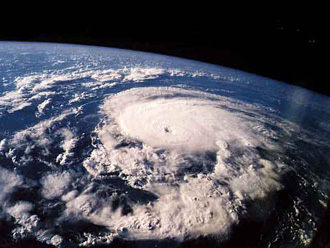 |
 |
 |
 Editorials | Environmental | September 2007 Editorials | Environmental | September 2007  
Scientists Second-Guessing Hurricane Paths
 Diego Cevallos - IPS Diego Cevallos - IPS
go to original


| | According to Mexican scientist Mario Molina, winner of the Nobel Prize for Chemistry in 1995, the increasing intensity and frequency of hurricanes is associated with climate change triggered by global warming. |
Mexico City - Hurricanes Dean, Felix and Henriette caused dozens of deaths and millions of dollars worth of damage in the tropical zone of the Americas in just over two weeks. But worse may lie ahead, as five large cyclones are expected to materialise before the storm season is over.

Scientists point out that this year's tropical storm season, which spans from June to November, is unprecedented in that two category five (the most intense) hurricanes appeared within a very short time interval: Dean, which hit Mexico in late August, and Felix, which last week destroyed part of northern Nicaragua.

Colorado State University had forecast that five hurricanes above category three on the Saffir-Simpson hurricane intensity scale of one to five, which classifies tropical storms according to wind speed, would form in the Atlantic ocean this season. The historic average number of such strong hurricanes is 2.4 per year.

What meteorologists could not anticipate was that in the middle of the season, two consecutive category five hurricanes, Dean and Felix, would make landfall at peak intensity. The two storms are classified among the five most intense hurricanes since record-keeping began in 1851.

Updating their forecasts, Colorado State University researchers say that another five Atlantic hurricanes could form between now and November, three of which will probably be category three or above.

Renι Lobato and Ricardo Prieto, hurricane experts at the Mexican Institute of Water Technology, also told IPS that "We are half-way through this year's season, and we can expect several more hurricanes, possibly five, more or less."

William Gray, professor of atmospheric science at Colorado State University, ventured the opinion that while the 2007 hurricane season is "more active than normal," it will not turn out to be as "hyperactive" as those in 1995, 2004 and 2005.

In 2005 there were 28 tropical storms, 15 of which reached hurricane status, including the highly destructive hurricanes Stan and Katrina. In 2006 the picture was different: there were only five hurricanes, none of which posed serious dangers.

The 2007 hurricane season started unexpectedly on May 9, a month earlier than usual, when subtropical storm Andrea formed over the Atlantic.

Nicaragua has suffered the most damage so far, with hurricane Felix leaving 40 people dead and nearly 200 missing. Mexico is in second place, with 11 deaths caused by hurricanes Henriette, on the Pacific coast, and Dean. Hurricane Dean also left nine people dead in Haiti, two in the Dominican Republic, one in St. Lucia and three in Jamaica.

Hurricane formation depends on a combination of factors: ocean temperatures above 27 or 28 degrees Celsius in near-tropical latitudes, causing evaporation and condensation, and a low-pressure centre, together with colder air contributed by the upper layers of the atmosphere.

According to Mexican scientist Mario Molina, winner of the Nobel Prize for Chemistry in 1995, the increasing intensity and frequency of hurricanes is associated with climate change triggered by global warming, which most experts link to excessive greenhouse gas emissions from burning fossil fuels and other human activities.

Hurricanes will continue to increase in number and power in the coming decades, unless "the entire planet takes action" to combat climate change, Molina warned.

Lobato and Prieto are not completely in agreement with that assertion.

In a message to IPS, they indicated that storms and their larger siblings, hurricanes, "have existed on the planet since pre-industrial times, which means they are not caused by human activity, but by thermal and dynamic processes in the atmosphere, on the continent and in the oceans."

"These processes do not behave in a constant way, and there is a natural variability in the number and intensity of tropical cyclones year by year," they said.

"It is not yet possible to determine the precise effect of climate change on hurricane seasons, and more detailed studies are required before firm conclusions can be reached," they added.

The two Mexican experts regretted that so far all attempts to artificially weaken hurricanes have failed.

Over the last 40 years, different laboratories worldwide have been testing methods, such as using a liquid to prevent the evaporation of seawater, releasing soot in the vicinity of an incipient tropical storm to weaken its centre, and seeding nearby clouds with silver iodide, the only experimental method to have been field tested. But nothing has worked.

"Given this failure, the current approach is to work on improving preventive measures, including early warning systems, mass evacuations, insurance against losses, and budgeting for aid and reconstruction of affected communities," said Lobato and Prieto.

Over and above the possibility of discovering a method of taming the whirlwinds, the common sense measures undertaken "have been successful, and we hope that they will continue to improve in the short term," they said. | 
 | |
 |



